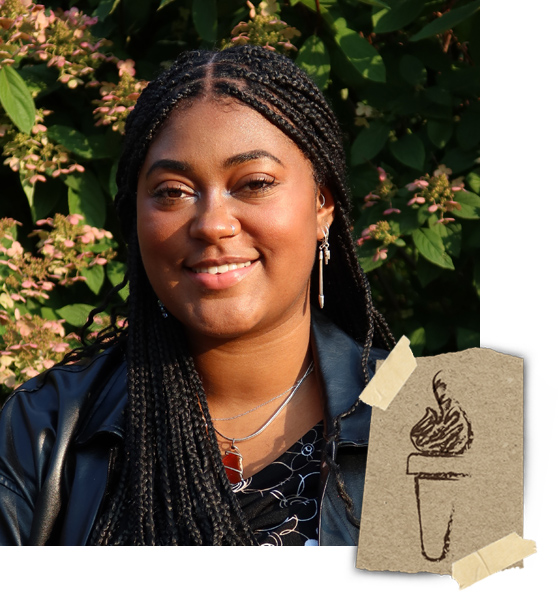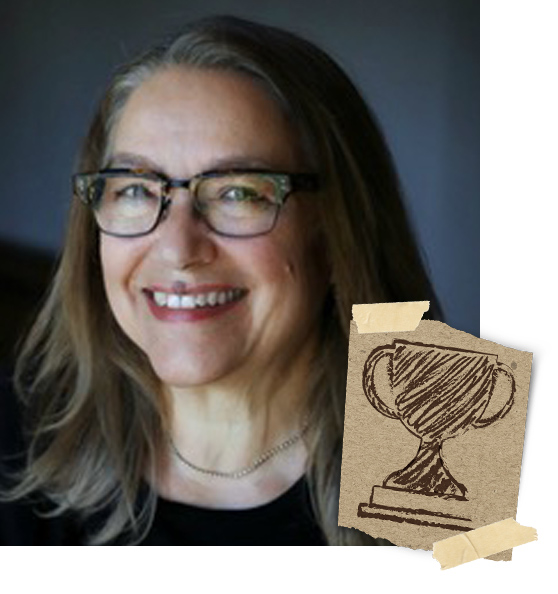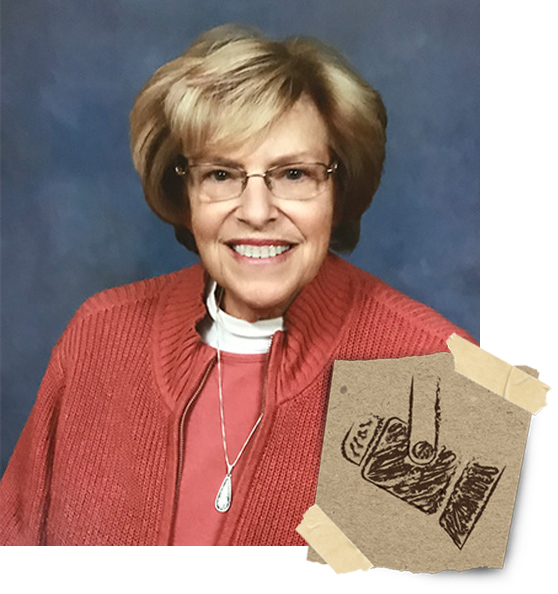Diversity Torch: Taylor Hughes-Barrow
March 14, 2024 - Emily Jodway
 Taylor Hughes-Barrow, like many high school seniors, was looking forward to her first year on a college campus. For many it’s the first steps into adulthood and independence, a chance to make new friends, find more people with similar interests and dive into research and studies on what we are most passionate about. For Hughes-Barrow, that was the advancement of diversity and equity, especially among kids like her- first-generation college students navigating the world of higher education.
Taylor Hughes-Barrow, like many high school seniors, was looking forward to her first year on a college campus. For many it’s the first steps into adulthood and independence, a chance to make new friends, find more people with similar interests and dive into research and studies on what we are most passionate about. For Hughes-Barrow, that was the advancement of diversity and equity, especially among kids like her- first-generation college students navigating the world of higher education.
The 2020 Covid-19 pandemic and lockdown threw a wrench into Taylor and many other student’s first-year plans. “It was super difficult going into my first year and having it be ‘Zoom University,’ she said. “I was like, this is all that I’ve worked for? Just to end up sitting at home?”
But Taylor found a silver lining when she joined the MSU Multiracial Unity Living Experience (MRULE). The group met weekly over Zoom to discuss personal challenges as well as social and global issues. It created a community for her without even living on campus. Through the program, she signed up to be an Intercultural Aid (ICA) and became one of the students to lead these discussions and support other incoming students. “I still felt brand new at the university, but it was nice to navigate that together and cultivate spaces where we could talk about relevant issues that a lot of students can relate on.”
After coming into MSU as a prelaw student, Taylor took a class in Human Development and Family studies and found she had a greater passion for helping others and being a part of finding solutions to various social issues.
She has had the chance to take part in several DEI initiatives across campus, all of which have assisted in her research efforts while also giving her a direct opportunity to advocate for her peers. She is a member of the Dean’s Student Advisory Committee (DSAC) and the Dean’s Advisory Committee on Diversity and Inclusion (DACDI), serving as an undergraduate representative. Both groups offer a space for her and other students to share their experiences and voice concerns to those who are more able to implement change at the university level.
“It’s nice to see people not just talking about it, but having action behind what we’re talking about and really thinking about what DEI actually looks like, what it entails, and really being expansive with that idea as well,” she said.
Much of Taylor’s research focuses on expanding opportunities for underrepresented students, while also helping them navigate opportunities and activities on campus that they might not even know exist. She looked through the institution’s DEI statistics and examined graduation rates across race and ethnicity and the disparities that still exist today. Another project of hers done in a grant writing class led by professor Joyce Meier was a proposal for the design of an online system that would assist students with the finding of clubs, resources and assistance tailored to their needs, to foster their sense of belonging on campus.
“It really allowed me to think creatively about designing technology and ways we can meet people where they are; this system would cultivate all the resources we hear that we have on campus based on your personal identity,” she explained. “If I were to enter in that I was a first-gen Black student interested in gender studies, it could find courses, workshops, and clubs that were relevant to my identity. I think there’s so many great communities here, but they can sometimes be hard to find.”
This led to a fellow student earning funding for the Black Book, a guide that takes inspiration from the historic Negro Motorist Green Book by Victor Hugo Green, which assisted Black travelers in the Jim Crow era to safely navigate the South while vacationing. Taylor and Charlotte Bachelor’s project will create a version unique to MSU that provides a list of academic, social and community resources tailored to making campus a more welcoming environment for Black students. This will then be available for free in physical and digital formats.
Taylor is also a member of the Women’s Leadership Institute Student Cohort. She enjoys having a supportive community of women where she can share experiences with fellow students and receive advice and support from women leaders and mentors. It’s definitely helped me fine-tune some of my skills and has given me an intimate group and space to have deeper connections,” she said.
This idea of women’s achievements being acknowledged coincides with other research initiatives she has been a part of. Taylor worked on a Digital Humanities project for the Monuments Men and Women Foundation, creating a new digital exhibition with her classmates highlighting the accomplishments of the women that worked alongside soldiers in World War II to retrieve and restore priceless art stolen by the Nazis.
“The foundation’s website had a lack of information, and we wanted to bring light to their contributions,” Taylor said. “Just because they don’t have a lot of information available about them doesn’t mean their stories don’t deserve to be heard. “In history a lot of women, and marginalized women especially, often do not get the luxury of telling their story from their voices. It is critical to uplift their voices and recognize their amazing contributions.”
Taylor spoke similarly of the importance of this action especially during Women’s History Month. “It’s really important to highlight the contribution and work of women. As a Black woman, as a young woman, to see myself reflected … representation is so powerful and important toward positive development and sense of self esteem” she said. “One thing that I definitely want to do is not only do great things myself, but open the doors for women and create spaces for women of color to have autonomy within those spaces to speak their mind freely.”
Read more:

Diversity Champion
Faculty/Staff
Dr. Lisa Fine
A professor of history, Dr. Lisa Fine has spent over 30 years at Michigan State working to advance opportunities for all students across campus, but has particularly made immeasurable strides in making the university a safer and more inclusive place for gender minorities. She co-founded the Center for Gender in Global Context and revived the Women’s Studies major, both of which brought to the forefront gender and women’s issues through a global lens.

Diversity Spotlight
Alumni
Dr. Barbara Lowrey
Born and raised in East Lansing and inspired throughout her youth by her educator parents, Barbara Lowrey made the decision to pursue a career in economics all the way through to a doctoral degree, becoming the first woman at Michigan State to receive a PhD from the department. Lowrey spent several decades in America’s political epicenter working at the Federal Reserve Board, breaking barriers and setting new standards for women along her way.

Diversity Matters
We strive to cultivate an inclusive and welcoming college environment that celebrates a diversity of people, ideas, and perspectives.

